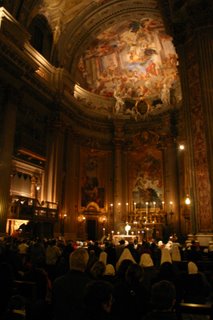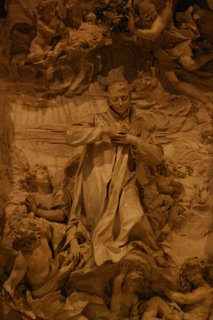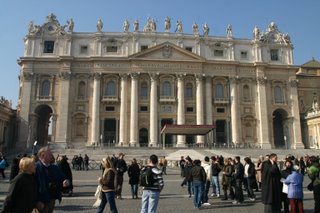Image: St. Philomena Appears to St. John Vianney
"Blessed, O Lord, are those who dwell in Thy house: they shall praise Thee for ever and ever."
To dwell in the house of the good God, to enjoy the presence of the good God, to be happy with the happiness of the good God--oh, what happiness, my children! Who can understand all the joy and consolation with which the saints are inebriated in Paradise? Saint Paul, who was taken up into the third heaven, tells us that there are things above which he cannot reveal to us, and which we cannot comprehend.... Indeed, my children, we can never form a true idea of Heaven till we shall be there. It is a hidden treasure, an abundance of secret sweetness, a plenitude of joy, which may be felt, but which our poor tongue cannot explain. What can we imagine greater? The good God Himself will be our recompense: Ego merces tua magna nimis--I am thy reward exceeding great. O God! the happiness Thou promisest us is such that the eyes of man cannot see it, his ears cannot hear it, nor his heart conceive it.
Yes, my children, the happiness of Heaven is incomprehensible; it is the last effort of the good God, who wishes to reward us. God, being admirable in all His works, will be so too when He recompenses the good Christians who have made all their happiness consist in the possession of Heaven. This possession contains all good, and excludes all evil; sin being far from Heaven, all the pains and miseries which are the consequences of sin are also banished from it. No more death! The good God will be in us the Principle of everlasting life. No more sickness, no more sadness, no more pains, no more grief. You who are afflicted, rejoice! Your fears and your weeping will not extend beyond the grave. . . . The good God will Himself wipe away your tears! Rejoice, O you whom the world persecutes! your sorrows will soon be over, and for a moment of tribulation, you will have in Heaven an immense weight of glory. Rejoice! for you possess all good things in one-the source of all good, the good God Himself.
Can anyone be unhappy when he is with the good God; when he is happy with the happiness of the good God, of the good God Himself; when he sees the good God as he sees himself? As Saint Paul says, my children, we shall see God face to face, because then there will be no veil between Him and us. We shall possess Him without uneasiness, for we shall no longer fear to lose Him. We shall love Him with an uninterrupted and undivided love, because He alone will occupy our whole heart. We shall enjoy Him without weariness, because we shall discover in Him ever new perfections; and in proportion as we penetrate into that immense abyss of wisdom, of goodness, of mercy, of justice, of grandeur, and of holiness, we shall plunge ourselves in it with fresh eagerness. If an interior consolation, if a grace from the good God, gives us so much pleasure in this world that it diminishes our troubles, that it helps us to bear our crosses, that it gives to so many martyrs strength to suffer the most cruel torments --what will be the happiness of Heaven, where consolations and delights are given, not drop by drop, but by torrents!
Let us represent to ourselves, my children, an everlasting day always new, a day always serene, always calm; the most delicious, the most perfect society. What joy, what happiness, if we could possess on earth, only for a few minutes, the angels, the Blessed Virgin, Jesus Christi In Heaven we shall eternally see, not only the Blessed Virgin and Jesus Christ, we shall see the good God Himself! We shall see Him no longer through the darkness of faith, but in the light of day, in all His Majesty! What happiness thus to see the good God! The angels have contemplated Him since the beginning of the world, and they are not satiated; it would be the greatest misfortune to them to be deprived of Him for a single moment. The possession of Heaven, my children, can never weary us; we possess the good God, the Author of all perfections. See, the more we possess God, the more He pleases; the more we know Him, the more attractions and charms we find in the knowledge of Him. We shall always see Him and shall always desire to see Him; we shall always taste the pleasure there is in enjoying the good God, and we shall never be satiated with it. The blessed will be enveloped in the Divine Immensity, they will revel in delights and be all surrounded with them, and, as it were, inebriated. Such is the happiness which the good God destines for us.
We can all, my children, acquire this happiness. The good God wills the salvation of the whole world; He has merited Heaven for us by His death, and by the effusion of all His Blood. What a happiness to be able to say, "Jesus Christ died for me; He has opened Heaven for me; it is my inheritance. . . . Jesus has prepared a place for me; it only depends on me to go and occupy it. Vado vobis parare locum--I go to prepare a place for you. The good God has given us faith, and with this virtue we can attain to eternal life. For, though the good God wills the salvation of all men, He particularly wills that of the Christians who believe in Him: Qui credit, habeat vitam aeternam--He that believeth hath life everlasting. Let us, then, thank the good God, my children; let us rejoice--our names are written in Heaven, like those of the Apostles. Yes, they are written in the Book of Life: if we choose, they will be there forever, since we have the means of reaching Heaven.
The happiness of Heaven, my children, is easy to acquire; the good God has furnished us with so many means of doing it! See, there is not a single creature which does not furnish us with the means of attaining to the good God; if any of them become an obstacle, it is only by our abuse of them. The goods and the miseries of this life, even the chastisements made use of by the good God to punish our infidelities, serve to our salvation. The good God, as Saint Paul says, makes all things turn to the good of His elect; even our very faults may be useful to us; even bad examples and temptations. Job was saved in the midst of an idolatrous people. All the saints have been tempted. If these things are, in the hands of God, an assistance in reaching Heaven, what will happen if we have recourse to the Sacraments, to that never-failing source of all good, to that fountain of grace supplied by the good God Himself! It was easy for the disciples of Jesus to be saved, having the Divine Saviour constantly with them. Is it more difficult for us to secure our salvation, having Him constantly with us? They were happy in obtaining whatever they wished for, whatever they chose; are we less so? We possess Jesus Christ in the Eucharist; He is continually with us, He is ready to grant us whatever we ask, He is waiting for us; we have only to ask. O my children! the poor know how to express their wants to the rich; we have only our indifference, then, to accuse, if assistance and graces are wanting to us. If an ambitious or a covetous man had as ample means of enriching himself, would he hesitate a moment, would he let so favourable an opportunity escape? Alas! we do everything for this world, and nothing for the other? What labor, what trouble, what cares, what sorrows, in order to gather up a little fortune! See, my children, of what use are our perishable goods? Solomon, the greatest, the richest, the most fortunate of kings, said, in the height of the most brilliant fortune: "I have seen all things that are done under the sun; and behold, all is vanity and vexation of spirit. " And these are the goods to acquire which we labor so much, whilst we never think of the goods of Heaven! How shameful for us not to labor to acquire it, and to neglect so many means of reaching it! If the fig tree was cast into the fire for not having profited by the care that had been taken to render it fertile; if the unprofitable servant was reproved for having hidden the talent that he had received, what fate awaits us, who have so often abused the aids which might have taken us to Heaven? If we have abused the graces that the good God has given us, let us make haste to repair the past by great fidelity, and let us endeavour to acquire merits worthy of eternal life.
Read more on St. John Vianney



















